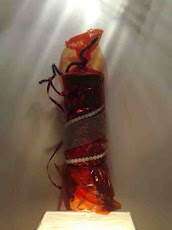I am sometimes flummoxed by our US friends Recipe's ingredients... what is heavy cream? Perhaps in the US people are also likewise confused... what is a courgette?
Here then is a basic list of my most popular confusions. If there are any mistakes there, please let me know.
biscuit - scone
broiler - grill
canned - tinned
cookie - biscuit
cookie sheet/baking pan - baking tray
hard-cooked eggs - hard-boiled eggs
mold - mould
noodles - pasta
pie pan - pie tin
plastic wrap - cling film
rack - shelf
shortdough pastry - shortcrust pastry
stovetop - cooker/hob
wax paper - greaseproof paper
all-purpose flour = plain flour
andouille sausage = smoked sausage
baking soda = bicarbonate of soda
bouillon granules = stock cube
cilantro = fresh coriander
confectioners' sugar = icing sugar
frozen whipped topping = long-life whipped UHT cream
corn syrup = golden syrup
cornstarch = cornflour
egg substitute = egg white
eggplant = aubergine
fava beans = broad beans
frosting = icing
garbanzo beans = chickpeas
graham cracker = digestive biscuit
granulated sugar = caster sugar
great Northern beans = cannellini beans
green onions = spring onions
ground beef (ground lamb, turkey, pork) = minced beef (minced lamb, turkey, pork)
half and half = single cream
ham steaks = gammon steaks
heavy cream = whipping cream
instant pudding mix = whipped dessert mix
Jell-O gelatin = jelly
jelly = jam
lasagna noodles = lasagne sheets
molasses = treacle
non-fat milk = skimmed milk
oatmeal = porridge
pie crust = pastry crust
pizza crust = pizza base
pork tenderloin = pork fillet
potato chips = potato crisps
reduced fat milk = semi-skimmed milk
semisweet chocolate = dark chocolate
shortening (e.g., Crisco) = butter or margarine, or vegetable fat spread (e.g., Stork)
snow peas = mangetout
tomato paste = tomato puree
whole wheat flour = wholemeal flour
zucchini = courgette
Subscribe to:
Post Comments (Atom)

8 comments:
Peter
Thank you for posting this list which will be very helpful. Looking at some of the American terms, without a list like this you would never be able to guess the UK equivalents.
Thanks, this is very helpful.
Yes Peter, I know what you mean. When I forst arrived here from New Zealand I got a little confused. granulated sugar = caster sugar are different, caster sugar is finer than granulated. You can buy both in the shops in the UK. and noodles and pasta are different. I don't know how but pasta is a mediteranian food and noodles are asian.
I would love for others to show us any other differences.
Margaret
Ah!!! So THAT'S what "treacle" is! I've seen recipes for 'treacle tart' and such, and wondered what the heck "treacle" is. *grin*
I noticed that OUR "jelly" is what you consider "jam". I wanted to note, that "jelly" is considered the pectin-laced JUICES of fruit that can be used as a spread. We DO have "Jam" as well which is SIMILAR to jelly except that "jam" contains actual pieces of the fruit. So, if you took a bunch of strawberries and simmered them down, then strained out all the pieces of fruit using ONLY the juice, and added pectin, you'd wind up with "jelly". If you left all those fruit pieces IN the juice, and added the pectin, you'd have "jam."
Also, "half & half" can be "non-fat" or "regular." That is: half & half is literally half cream and half milk. If you use regular (whole, un-skimmed) milk, you get "regular half & half", if you use non-fat (we also refer to it sometimes as "skim") milk, you get "non-fat" half & half. (Which is a complete mis-nomer because the simple fact that half & half contains cream means that even the half & half made with skimmed milk STILL contains the fat contained in the cream that the skimmed milk is combined with. *getting dizzy* Sorry. I'll stop now. *wink*
We are confusing, our inability to agree on a common term, aren't we?!?! *grin* Thanks for posting this, Peter. It is interesting to see the differenes that have developed in our languages. Even when those differences are as simple as cooking & food terms.
Being "from across the pond" this list made me giggle, there were so many terms I had to learn not least of all when it came to cooking :-)
I'm catching up. Fantastic. Tahnks. Liz
I really like the term goldes syrup-it sounds much nicer than corn syrup-and I have always preferred the term 'aubercine'as opposed to eggplant-yuck.
In the US, pasta is the word for unleavened dough, made of wheat flour, water, and sometimes eggs, that is molded into any of a variety of shapes and boiled, such as penne, macaroni, spaghetti,etc always Italian in origin. Noodles refers to the flat or round(unleavened dough blah blah) noodly things that have European(e.g. kluski) or Asian origins.
Andouille sausage is, indeed smoked, but it is seasoned per a specific recipe originationg in Louisiana among Cajun folk. We have many smoked sausages in the US.
Post a Comment